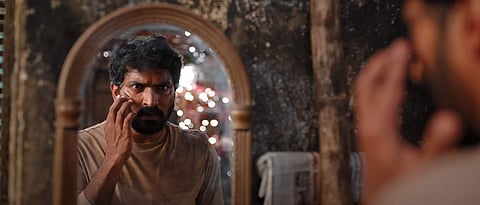Buffoon Movie Review: Strong intent marred by incohesive execution
Rating:(2.5 / 5)
There are two voiceovers in Buffoon. One, right in the beginning, where we are informed about the coastline of Tamil Nadu, and how a criminal named Dhanapalan is the kingpin of a particular stretch. A stretch that sees the smuggling of drugs, and live animals. It is also a stretch that sees a lot of refugees from Sri Lanka finding their way to and from India. It is an interesting exposition that not only sets the ball rolling but also captures our attention. The second voiceover comes when Kumaran (Vaibhav), who is unwittingly caught in the world of drugs, murder, politics, and betrayal, decides to fight back. However, by this time, we are hardly interested in what happens to Kumaran or any of the other assembly line characters who are all given the rawest of deals.
Cast: Vaibhav, Anagha, Joju George, Anthakudi Ilayaraja
Director: Ashok Veerappan
The underlying theme of Buffoon is greed. It is one man’s greed for power that infuriates another man’s greed for superiority. In the recent Silambarasan film, Vendhu Thanindhathu Kaadu, we saw how a bunch of people are just cogs in the machine. Kumaran and his friend Muthaiah (Anthakudi Ilayaraja), who are bored with their lives of being ‘buffoons’ in a theatre group, want to go abroad and make money. One odd job leads to another, and the duo finds themselves in the middle of a crumbling drug mafia fuelled by political rivalry. While Kumaran and Muthaiah are the protagonists, the myriad of peripheral characters are interesting additions in Buffoon. While the political players are just stereotypes, Anagha’s Ilayal is fascinating. Although the romance sequences between Kumaran and her are a downer, Ilayal’s feistiness had immense potential. However, this angle isn’t explored enough, and we are left with a generic tale of an underdog finding his way in the big, bad world.
Despite sticking to a largely tried-and-tested template, there are a couple of subversive touches that add to the ingenuity of Buffoon. There is the Eelam Tamil angle that looms large, and Ilayal poses some uncomfortable questions about the way the refugees are treated in the country. She also raises pertinent points about the system’s inherent bias against the community, and how they are treated in this country. There is also a poignant recitation around the interval point that encapsulates the struggle for identity and a place to call home. While this aspect is far from being just a superficial afterthought in Buffoon, the film needed a bit more exploration of this theme. In fact, Buffoon’s need to bring in certain commercial elements doesn’t always work in the film’s favour.
What really works in Buffoon is definitely Santhosh Narayanan’s eclectic songs and background score, and Dinesh Purushothaman’s cinematography. The writing blows hot and cold, and this inconsistency is the biggest drawback of the film, which suffers from jarring tonal shifts. Also, the trump card or the recurring gag of Buffoon is definitely the identity of Dhanapalan. And when you have a reputed actor in the cast, and he is missing for long stretches of the film, it isn’t that tough to do this maths. Even if they force-fit a red herring, which frankly is insulting to our collective sensibilities, the ‘reveal’ isn’t as revelatory as the makers thought it would be. In fact, Buffoon would have benefitted by not having this angle at all, because it only adds to our disappointment about the film.
Kumaran, who is on the run from the cops for the majority of the film, hardly shows any sign of trepidation. We see him chilling at the local bar, and visiting his theatre actor father without the slightest sense of fear of being caught by the cops. While it is a welcome change that we have actor-director Tamilarasan playing a cop completely different from his previous turn as a cop in Jai Bhim, the initial drive in this character goes missing as the narrative progresses.
This is the biggest problem of Buffoon, which mostly flatters to deceive. A solid character arc for Anagha’s role gets flattened by a cliched ending. Muthiah’s character, an interesting sidekick/friend of sorts, is treated with utter disdain, and even when he goes missing for a long time in between, we aren’t given any explanation about any of it. The theatre artistes angle gets an interesting start but fizzles out soon after to become mere distractions to the plot. The vagaries of political alliances and affiliations are neatly brought to the fore, but the writing bites off more than it can chew. There is a brief sojourn into a legal drama territory about the fight for identity, but it is just dropped soon after. We also have a commentary on how it is not just the Kumarans but the cops too who are mere cogs in the machinery of power. But, this realisation needed a lot more punch than what the film makes of it.
Too many themes pull down Buffoon because the film crams for a resolution for almost every issue it takes up in the 118-minute runtime. It isn’t just about the lack of logic in these resolutions, but the utter lack of thought given to some of them, especially the final resolution, which is laughable at best. Although Buffoon definitely has a lot of heart and even more potential, there is only so much that intent can do when it has to contend with lackadaisical execution bogged further down by nonchalant writing.

